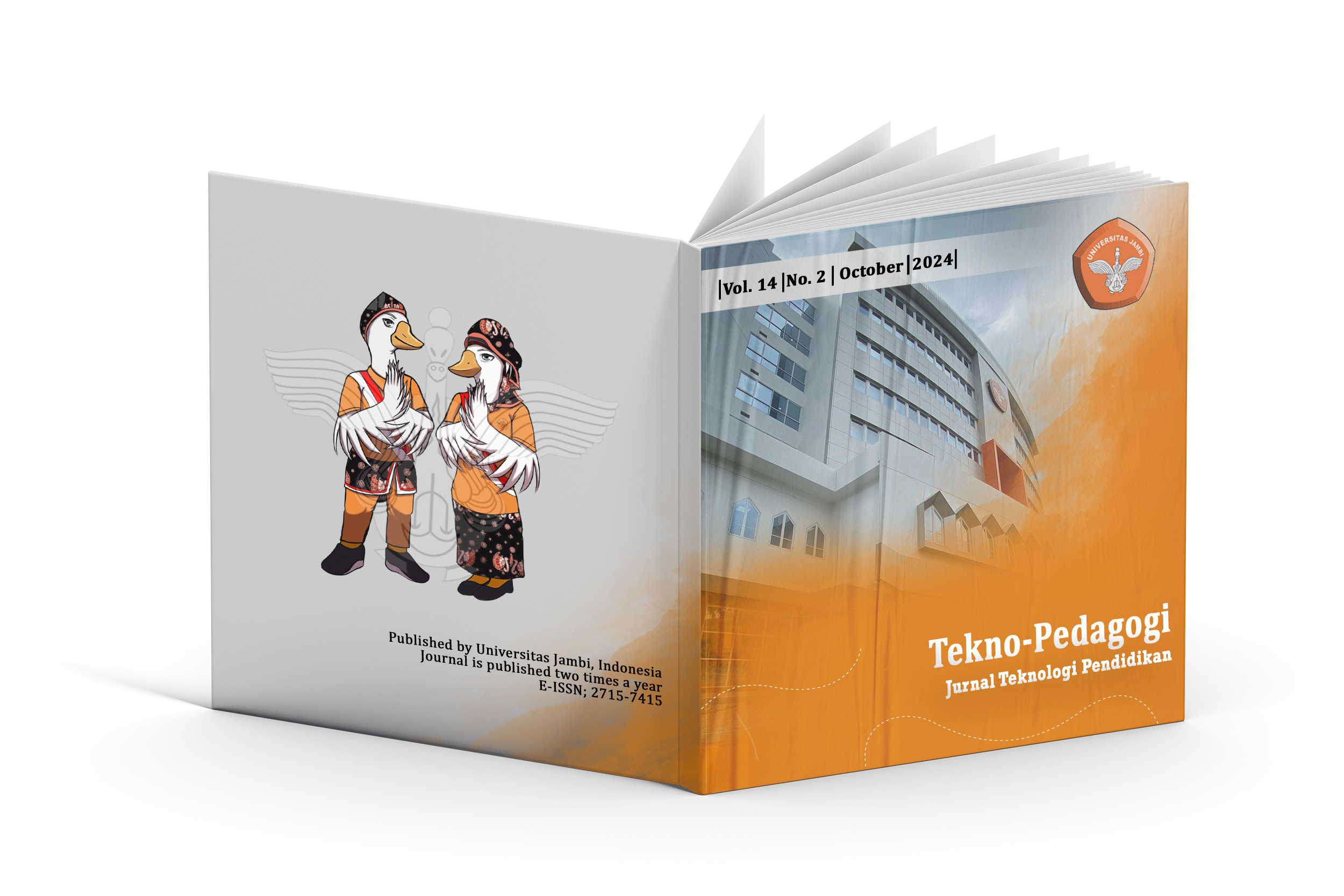Development of Student Worksheets Based on a Scientific Approach to Colloidal System Material
DOI:
https://doi.org/10.22437/teknopedagogi.v14i2.37485Keywords:
Colloidal System, Scientific Approach, Student WorksheetAbstract
The purpose of this study was to determine the feasibility of developing student worksheets based on a scientific approach, student responses and teacher responses to the developed student worksheets. The type of research used was research and development with a 4D model. The instruments used in this study were validation sheets and response questionnaires. Before the field trial was conducted, the student worksheets were validated by a team of experts to determine the shortcomings of the student worksheets, then revised and tested. The results showed that the average percentage obtained from the media expert validator was 80.66%, material experts 85.33%, and language experts 82.66%, with an average percentage of 82.88%, this indicates that the student worksheets can be used with feasible criteria. The percentage obtained from the results of student responses was 34% very interested, 55% interested, and 11% less interested. The percentage of teacher response results was 25% very interested, 65% interested, and 10% less interested, this shows that the student worksheets developed can be used in State Islamic High School 5, Aceh Besar. Research on the development of student worksheets based on a scientific approach to colloidal system material offers innovation in more interactive learning, encourages conceptual understanding through exploration and experimentation, and improves students' critical thinking skills.
Downloads
References
Abnisa, A. P., & Zubairi, Z. (2022). Personality Competence Educator and Students Interest in Learning. Scaffolding: Jurnal Pendidikan Islam Dan Multikulturalisme, 4(1), 279–290.
Akkas, H., & Meydan, C. H. (2024). Sampling Methods in Qualitative Sampling in Multicultural Settings. In Principles of Conducting Qualitative Research in Multicultural Settings (pp. 32–54). IGI Global
Handayani, D., Hufad, A., Tukimin, S., Rochyadi, E., & Nandiyanto, A. B. D. (2020). Teaching Ph of suspension containing colloidal particles suspension to students with deaf and hard hearing. Journal of Engineering Science and Technology, 15, 48–57.
Haryadi, R., & Pujiastuti, H. (2020). PhET simulation software-based learning to improve science process skills. Journal of Physics: Conference Series, 1521(2), 22017.
Kanwal, W., Qamar, A. M., Nadeem, H. A., Khan, S. A., & Siddique, M. (2022). Effect of Conceptual Understanding of Mathematical Principles on Academic Achievement of Secondary Level Chemistry Students. Multicultural Education, 8(3), 242–254.
Karunarathna, I., Gunasena, P., Hapuarachchi, T., & Gunathilake, S. (2024). The crucial role of data collection in research: Techniques, challenges, and best practices. ResearchGate. https://www. researchgate. net/publication/383155720.
Katauhi, R. C., Widodo, W., & Sari, D. A. P. (2022). Implementation of the science e-module based on guided inquiry with the flipped classroom strategy to improve students science process skills. Jurnal Pijar Mipa, 17(5), 657–665.
Khaidir, E., & Suud, F. M. (2020). Islamic education in forming students’ characters at as-shofa Islamic High School, pekanbaru Riau. International Journal of Islamic Educational Psychology, 1(1), 50–63.
Lubis, P. K. D., Adriani, D., & Silitonga, A. I. (2021). Teaching Materials Development Using Kvisoft Flipbook Maker Application in Creative Economy Courses with 4-D Model Design. 6th Annual International Seminar on Transformative Education and Educational Leadership (AISTEEL 2021), 792–796.
Mahsunah, E., & Shobah, N. (2022). Developing student’s English worksheet on reading materials for tenth grade. Lintang Songo: Jurnal Pendidikan, 5(1), 19–25.
Marsya, A. (2024). Strengthening the Nation’s Character and Moral Education Through Citizenship Education. International Journal of Students Education, 475–479.
Mazhar, S. A., Anjum, R., Anwar, A. I., & Khan, A. A. (2021). Methods of data collection: A fundamental tool of research. Journal of Integrated Community Health (ISSN 2319-9113), 10(1), 6–10.
Morgan, J., & Liker, J. K. (2020). The Toyota product development system: integrating people, process, and technology. Productivity press.
Mursyid, A. H. (2022). The Role Of Islamic Religious Education In The Formation Of Family And Civil Society. Tsaqofah: Jurnal Pendidikan Islam, 7(1), 39–62.
Muskita, M., & Subali, B. (2020). Effects of worksheets base the levels of inquiry in improving critical and creative thinking. International Journal of Instruction, 13(2), 519–532.
Mutlu, A. (2020). Evaluation of students’ scientific process skills through reflective worksheets in the inquiry-based learning environments. Reflective Practice, 21(2), 271–286.
Patresia, I., Silitonga, M., & Ginting, A. (2020). Developing Biology Students’ Worksheet Based on STEAM to Empower Science Process Skills. Journal of Biological Education Indonesia (Jurnal Pendidikan Biologi Indonesia), 6(1), 147–156.
Sember, V., Meh, K., Soric, M., Starc, G., Rocha, P., & Jurak, G. (2020). Validity and reliability of international physical activity questionnaires for adults across EU countries: systematic review and meta analysis. International Journal of Environmental Research and Public Health, 17(19), 7161.
Silaban, R., Sitorus, M., Panggabean, F. T. M., & Manullang, E. D. I. (2022). The Development of Electronic Module Based on Scientific Literacy on Colloidal Topic. International Journal of Computer Applications Technology and Research, 11(06), 223–230.
Upahi, J. E., Ramnarain, U., & Ishola, I. S. (2020). The nature of science as represented in chemistry textbooks used in Nigeria. Research in Science Education, 50, 1321–1339.
Wang, L.-Q., & Ren, J. (2020). Strategies, practice and lessons learned from remote teaching of the general chemistry laboratory course at Brown University. Journal of Chemical Education, 97(9), 3002–3006.
Widyaningrum, R., & Prihastari, E. B. (2020). Student worksheet based on Surakarta’s local wisdom in primary school: A preliminary research. International Journal of Science and Applied Science: Conference Series, 4(1), 56–65.
Yalyn, D., Sari, D. A. P., & Widodo, W. (2022). The implementation of student worksheets based on problem-based learning to improve students science process skill. Jurnal Pijar Mipa, 17(5), 569–576.
Downloads
Published
How to Cite
Issue
Section
License
Copyright (c) 2024 Nurlina Nurlina, Zeynep Ozsen, Lindiwe Jiyane

This work is licensed under a Creative Commons Attribution 4.0 International License.





